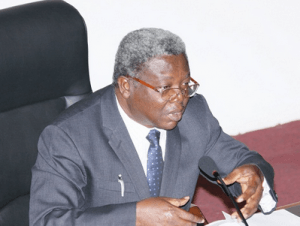Parliament vets Justice Appau for Supreme Court position

Mr Justice Yaw Appau, the Sole Commissioner on Judgment Debts, has indicated that some of the judgments needed to be investigated further for people whose negligence led to the debts to be sanctioned or prosecuted.
Appearing before the Appointments Committee of Parliament, Mr Justice Appau called on the government to open investigations into some of the cases that appeared before the Commission, and prosecute the officials whose actions and inactions led to the payment of those debts.
He appeared before the Committee to be vetted for a position to the Supreme Court, following his nomination by the President, together with Mr Gabriel Pwamang, a legal practitioner, and a former General Secretary of the People’s National Convention.
President John Dramani Mahama, a fortnight ago, nominated the two to serve as judges of the Supreme Court.
Going to serve on the Supreme Court, the highest in the land, one is subject to the examination and approval of the Appointments Committee of Parliament.
The Committee, chaired by Mr Ebo Barton-Odro, First Deputy Speaker, subjected the nominee to a marathon vetting for over six hours, questioning him on a wide range of issues dealing with his life experiences.
He was also interrogated on his academic background, as well as some high profile cases he dealt with at the lower courts, such as the death of Ya Naa Yakubu Andani the second, the Overlord of the Dagbon Traditional Area.
The late Ya-Naa was killed 13 years ago in a chieftaincy dispute.
Mr Justice Appau refrained from making detailed comments, explaining that, he had recently submitted his Report to the President for a White Paper to be issued, and would not want to put some of the information out.
However, he said the Commission had recommended to the government to investigate and punish some of the public officials whose actions led to the payment of the judgment debts.
He explained that the Commission’s recommendation was a call for further investigation into some of the matters, but did not state what those matters were.
On the controversial GH¢51-million judgment debt paid to businessman, Alfred Agbesi Woyome, and why the Commission did not invite Woyome to appear before it, he said it was not necessary to invite him.
Mr Justice Appau said, the whole issue on the Woyome case was documentary and that the businessman would not have provided any further evidence which had not already been documented.
“He (Woyome) would not have come to say anything different. We wrote to him and his lawyer to furnish us with the document and they submitted everything to us. It was a default judgment and later turned into a consent judgment.
“What the Commission was looking at was why that judgment was made,” he said.
Mr Justice Appau said some hearings were made in camera, especially a case involving the Accra Metropolitan Assembly on the Adenta Landfill Site, and expressed optimism that the work of the Commission would go a long way to assist the government to address judgment debt issues in the future.
When asked whether his nomination would not affect his decisions towards certain political quarters, he pointed out that when given the nod, no decision of his would be influenced by any president or political quarters.
He indicated that he did not consider his nomination political, because he was made a high court judge under former President Jerry John Rawlings, an appeal court judge under former President John Kufuor, and had been nominated for a slot on the Supreme Court by President Mahama.
There was drama in the middle of the vetting when a former Deputy Energy Minister, Mr Kobina Tahir Hammond, whose “drill ship” matter appeared before Mr. Appau’s Commission, decided to ask a question.
When it got to the turn of Mr Hammond, supported by Alhaji Baba Jamal, MP for Akwatia, he was not happy with the directive of the chair to ask the nominee only one question.
Mr Hammond, also the MP for Asokwa Adansi angrily replied: “if you think I am going to ask a questions about drill ship; then you are wrong.
“I have sat in this sitting throughout. People have asked five questions, why are you limiting me to only one?
Peeved with the chairman’s decision, Mr Hammond decided not to ask any question and walked out of the room.
When the Committee asked Mr. Appau whether, in his opinion, the Ya Na issue had come to a close, he indicated that he believed that the matter which was brought before him in 2003, had come to an end.
However, he said if there were suppressed facts which did not come up during the hearing, he would not know.
He expressed concern about the unwillingness of some members of the public who witnessed the crime to come forward to give evidence.
Evidently getting emotional about the Ya Na issue suggested to the Committee not to revisit the matter, adding that, “some people are attached to this issue and so when you talk too much about it, you make enemies.”
On death sentencing, the judge advocated a scrap death sentencing from the legal system.
He said in instances of wrong convictions, it would be a mistake to kill the accused before later realizing that the judgment was wrong, citing an instance where a woman, who had been imprisoned for 18 years for murder, but was later freed by the Appeal Court.
“The State would have made a big mistake if the woman had been executed for murder.
“It is better to acquit 99 guilty persons than to convict one innocent person. It is an aspect of the Mosaic Law which states that an eye for an eye. When somebody kills another person, why should the State make laws to kill that person? It is too retributive and it does not deter,” he said.
Source: GNA
